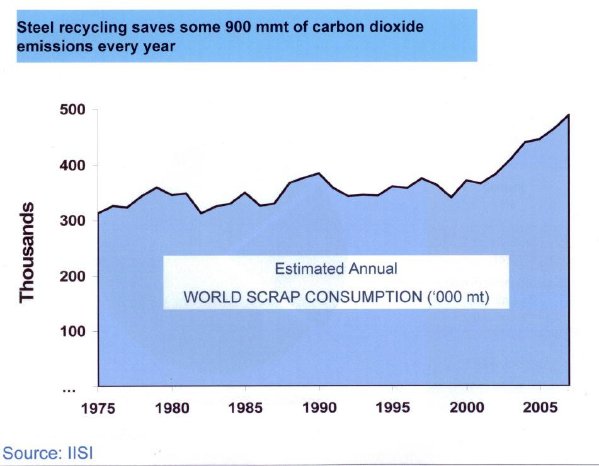"In comparison to using primary raw materials, melting one tonne of steel scrap saves about 1 tonne in carbon dioxide emissions, around 650 kg of coal and 1.5 tonnes of iron ore," he informed a dinner debate in the EU Parliament on Monday June 23rd. EFR organised the meeting and invited MEPs from different countries as well as representatives from the EU Commission and delegates from the EFR associations (see attachment).
The background to the meeting was a new package of action plans for sustainable industrial policy and sustainable consumption and production. The main objectives of the proposed package are the promotion of more sustainable consumption patterns and reducing the environmental impact of production processes. "Regarding these action plans, we cannot be satisfied with the adopted Waste Framework Directive," Karl-Heinz Florenz, MEP, told the meeting. "We need higher recycling quotas and some economic instruments to incorporate the waste management sector in the climate protection strategy." Mr Florenz asked the EFR delegates to devise proposals for economic instruments which could favour recycling processes over landfilling, especially in the Southern Eastern part of Europe.
EFR board member Christian Rubach of Interseroh AG noted that the European steel recycling industry has already gained over 140 years' experience of collecting, sorting, processing and marketing steel scrap. "In 2007, we produced 118 million tonnes of steel scrap in the EU-27," he said. "This corresponds to a saving of over 100 million tonnes of carbon dioxide."
Despite this self-evident success story, some delegates at the meeting were persuaded that the European recycling industry would make significantly faster progress if economic incentives were made available - for example, via an emission trading scheme for the waste management sector. Another idea was a landfill ban for secondary raw materials with positive market prices to increase recycling quotas for all waste streams.
EFR delegates identified the following as the most important demands for the future:
- The economic and ecological advantages of steel recycling should not hindered by over-regulation and inconsistent implementation of European environmental guidelines.
- Any form of steel scrap which can be used directly should no longer be declared as waste. Together with the European steel industry, we welcome the revision of the Waste Framework Directive - in particular its legal provisions for "End-of-Waste" - and we will work on concrete criteria for steel scrap qualities.
- There should be no legal vacuum between the "End-of-Waste" legislation (Waste Framework Directive) and the chemicals legislation (REACh) for substances, preparations and articles. However, we ask for concrete regulations that enable the recycling industry to handle REACh in a practical way. Every additional demand imposed by the chemical regulations would entail more work and cost for the recycling industry, which could lead to increased exports of secondary raw material from the EU-27.
- It is essential that recyclables become an important component of a political raw material strategy, whereby free raw material markets must be preserved for nonwaste materials.
Background information to EFR:
EFR is the body that represents the ferrous recycling industry of the European Union. It embraces 10 national federations representing a total of more than 1000 companies. Some of these companies are very large and operate almost Europe-wide. The majority are SMEs of varying size that work regionally or locally to recover and process all forms of ferrous scrap. Together they supply Europe's steelworks with 88 million tonnes of furnace feed a year.

